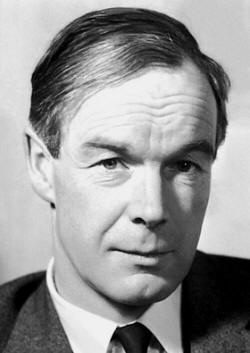Queer Places:
University of Cambridge, 4 Mill Ln, Cambridge CB2 1RZ
 Sir Alan Lloyd Hodgkin OM KBE PRS[1] (5 February 1914 – 20 December 1998) was an English physiologist and biophysicist who shared the 1963 Nobel Prize in Physiology or Medicine with Andrew Huxley and John Eccles.
From 1935 to 1937, Hodgkin was a member of the
Cambridge Apostles.[26]
Sir Alan Lloyd Hodgkin OM KBE PRS[1] (5 February 1914 – 20 December 1998) was an English physiologist and biophysicist who shared the 1963 Nobel Prize in Physiology or Medicine with Andrew Huxley and John Eccles.
From 1935 to 1937, Hodgkin was a member of the
Cambridge Apostles.[26]
In autumn of 1932 Hodgkin started as a freshman scholar at Trinity College,
Cambridge where his friends included classicists John Raven and Michael Grant,
fellow-scientists Richard Synge and John H. Humphrey,[15] as well as Polly and
David Hill, the children of Nobel Laureate Archibald Hill.[5][16] He took
Physiology with Chemistry and Zoology for the first two years, including
lectures by Nobel Laureate E.D. Adrian.[17] For Part II of the tripos he
decided to focus on physiology instead of zoology. Nevertheless, he
participated in a zoological expedition to the Atlas Mountains in Morocco led
by John Pringle in 1934.[18] He finished Part II of the tripos in July 1935
and stayed at Trinity as a research fellow.[19] During his studies, Hodgkin,
who described himself as "having been brought up as a supporter of the British
Labour Party"[20] was friends with communists[21] and actively participated in
distribution of Anti-War pamphlets.[22] At Cambridge, he knew James
Klugmann[23] and John Cornford,[24] but he emphasised in his autobiography
that none of his friends "made any serious effort to convert me [to
Communism], either then or later."[25]
During his stay at the Rockefeller Institute in 1937, Hodgkin got to know the American pathologist Francis Peyton Rous[76] who was later awarded the 1966 Nobel Prize in Physiology or Medicine.[77] When Rous invited him for dinner to his home, Hodgkin got to know Rous' daughter, Marni, who was then a student at Swarthmore College.[76] He proposed to her before going back to England in 1938, but she rejected him.[78] When Hodgkin briefly returned to the US in 1944 (see Wartime activities), they reunited and got married on 31 March.[79] Their first daughter, Sarah, was born in April 1945, shortly before the Hodgkins moved back to Cambridge.[80] They had three more children – Deborah Hodgkin (born 2 May 1947),[81] Jonathan Hodgkin (born 24 August 1949),[82] and Rachel Hodgkin (born June 1951).[83] Marni became Children's Book Editor at Macmillan Publishing Company and a successful writer of children's literature, including Young Winter's Tales and Dead Indeed. Jonathan Hodgkin became a molecular biologist at Cambridge University. Deborah Hodgkin is also a successful psychologist.
From 1951 to 1969, Hodgkin was the Foulerton Professor of the Royal Society at Cambridge. In 1970 he became the John Humphrey Plummer Professor of Biophysics at Cambridge. Around this time he also ended his experiments on nerve at the Plymouth Marine Laboratory and switched his focus to visual research which he could do in Cambridge with the help of others while serving as president of the Royal Society. Together with Denis Baylor and Peter Detwiler he published a series of papers on turtle photoreceptors. [62] [63] [64] [65] [66] [67] [68]
From 1970 to 1975 Hodgkin served as the 53rd president of the Royal Society (PRS). During his tenure as PRS, he was knighted in 1972 and admitted into the Order of Merit in 1973.[69] From 1978 to 1984 he was the 34th Master of Trinity College, Cambridge.
He served on the Royal Society Council from 1958 to 1960 and on the Medical Research Council from 1959 to 1963. He was foreign secretary of the Physiological Society from 1961 to 1967. He also held additional administrative posts such as Chancellor, University of Leicester, from 1971 to 1984
Hodgkin suffered from a series of medical problems that began soon after his retirement as Master of Trinity. In 1989 he had a surgery to relieve pressure on the spinal cord from one of the intervertebral discs in his neck, which left him unable to walk without support, and with progressive disablement.[1] Hodgkin died in 1998 in Cambridge.[85]
My published books:


BACK TO HOME PAGE
 Sir Alan Lloyd Hodgkin OM KBE PRS[1] (5 February 1914 – 20 December 1998) was an English physiologist and biophysicist who shared the 1963 Nobel Prize in Physiology or Medicine with Andrew Huxley and John Eccles.
From 1935 to 1937, Hodgkin was a member of the
Cambridge Apostles.[26]
Sir Alan Lloyd Hodgkin OM KBE PRS[1] (5 February 1914 – 20 December 1998) was an English physiologist and biophysicist who shared the 1963 Nobel Prize in Physiology or Medicine with Andrew Huxley and John Eccles.
From 1935 to 1937, Hodgkin was a member of the
Cambridge Apostles.[26]